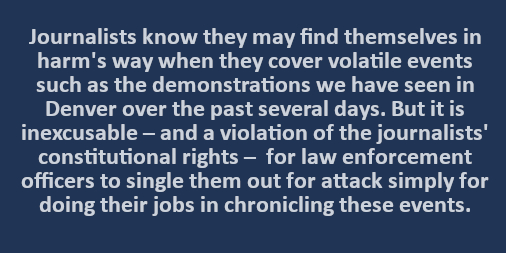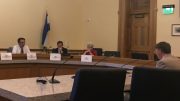On June 1, Colorado Freedom of Information, Colorado Press Association, Colorado Broadcasters Association and the Colorado Pro Chapter of the Society of Professional Journalists sent the following letter to leaders of the Denver Department of Public Safety, the Denver Police Department, the Colorado State Patrol and the Colorado National Guard and to Denver Mayor Michael Hancock and Gov. Jared Polis:
The Colorado Freedom of Information Coalition, the Colorado Press Association, the Colorado Broadcasters Association and the Colorado Pro Chapter of the Society of Professional Journalists write to express our profound concern over recent reports from several journalists that law enforcement agents have specifically targeted them while they’ve covered the protests in downtown Denver over the death of George Floyd. We call upon the Denver Department of Public Safety, the Colorado State Patrol and the Colorado National Guard to thoroughly investigate these extremely serious allegations, and, if confirmed, to hold the peace officers involved accountable.

Our organizations, like the general public, fully expect that any officers, troopers or guard soldiers who are found to have engaged in such violations of First Amendment rights will be appropriately disciplined. In addition, measures must be taken to ensure journalists are not targeted in the future.
We have noted the following troubling incidents:
- The Denver Post reported that photojournalist Hyoung Chang was struck twice Thursday night with pepper balls that cut his arm and shattered the press credential hanging around his neck. Chang said a Denver police officer fired two pepper balls directly at him.
- Denver Post reporter Elise Schmelzer, who was wearing a reflective vest with the word “Press” on it, said officers on Thursday fired at least one pepper ball at her feet.
- On Friday, a Denver7 reporter wrote on Twitter that a station photographer was hit four times by “paint balls” fired by police.
- On Saturday, a 9NEWS reporter wrote on Twitter that state Capitol security officers fired “something” that hit his backpack “just after I went live with a large camera and light.” The reporter was wearing a 9NEWS hat. He found a yellow-and-black projectile at the spot where he was hit.
- On Saturday, a reporter for Denverite wrote on Twitter: “Cops shoved me after I showed them my press credentials and forced me to inhale choking gas.”
- On Saturday, a journalist wrote on Twitter that, while standing with photographers, an officer kicked a rolling chemical cannister “sideways right into us. Took it full in the face …”
- On Sunday, another Denver Post reporter wrote on Twitter that he and a Denverite reporter, who was wearing a neon press vest, were ordered by an officer to move “toward an epic amount of tear gas … Cop points weapon right at us. We were forced back into the chaos and we both took a ton of gas to the face.” A New York Times reporter posted a photo of a contusion the Post reporter suffered after being hit with a projectile: “He screamed “Press” shortly before being hit as officers fired on protesters.”
Journalists know they may find themselves in harm’s way when they cover volatile events such as the demonstrations we have seen in Denver over the past several days. But it is inexcusable – and a violation of the journalists’ constitutional rights – for law enforcement officers to single them out for attack simply for doing their jobs in chronicling these events.
If they are not interfering with officers, journalists have First Amendment and state constitutional rights to record and document the activities of police and protesters in public spaces. Additionally, the Colorado legislature in 2015 enacted a law that specifically underscores the right to record police. If an officer “intentionally interferes” with a person’s lawful attempt to record an incident involving a peace officer, that person has a statutory right to recover damages from the law enforcement agency.
As a reminder, the Denver Police Department agreed to get enhanced First Amendment training for its officers after Colorado Independent Editor Susan Greene was wrongfully handcuffed and detained while photographing officers in 2018. The department also paid $50,000 to settle that case.
Again, we ask that these incidents be thoroughly investigated and that steps be taken to ensure that your officers respect the rights of journalists to report on newsworthy events in our state. Among other such steps, law enforcement should acknowledge legitimate press credentials of reporters, videographers and photographers and work with them, collaboratively, to guide them to safe locations so that they can carry out their newsgathering functions.
We ask that a joint press conference be held this week so that journalists have an opportunity to ask questions about law enforcement’s response during the protests. In addition, we would like to form and participate in a task force to determine concrete methods for avoiding a repeat of these kinds of incidents in the future.
We look forward to your prompt reply, and we welcome the opportunity to discuss other measures that your agencies might take to ensure the safety of journalists and to protect their constitutional rights.
Respectfully,
Jeff Roberts, Executive Director, Colorado Freedom of Information Coalition
Justin Sasso, President and CEO, Colorado Broadcasters Association
Jill Farschman, CEO, Colorado Press Association
Tony Flesor, President, Colorado Pro Chapter of Society of Professional Journalists
Follow the Colorado Freedom of Information Coalition on Twitter @CoFOIC. Like CFOIC’s Facebook page. Do you appreciate the information and resources provided by CFOIC? Please consider making a tax-deductible donation.




